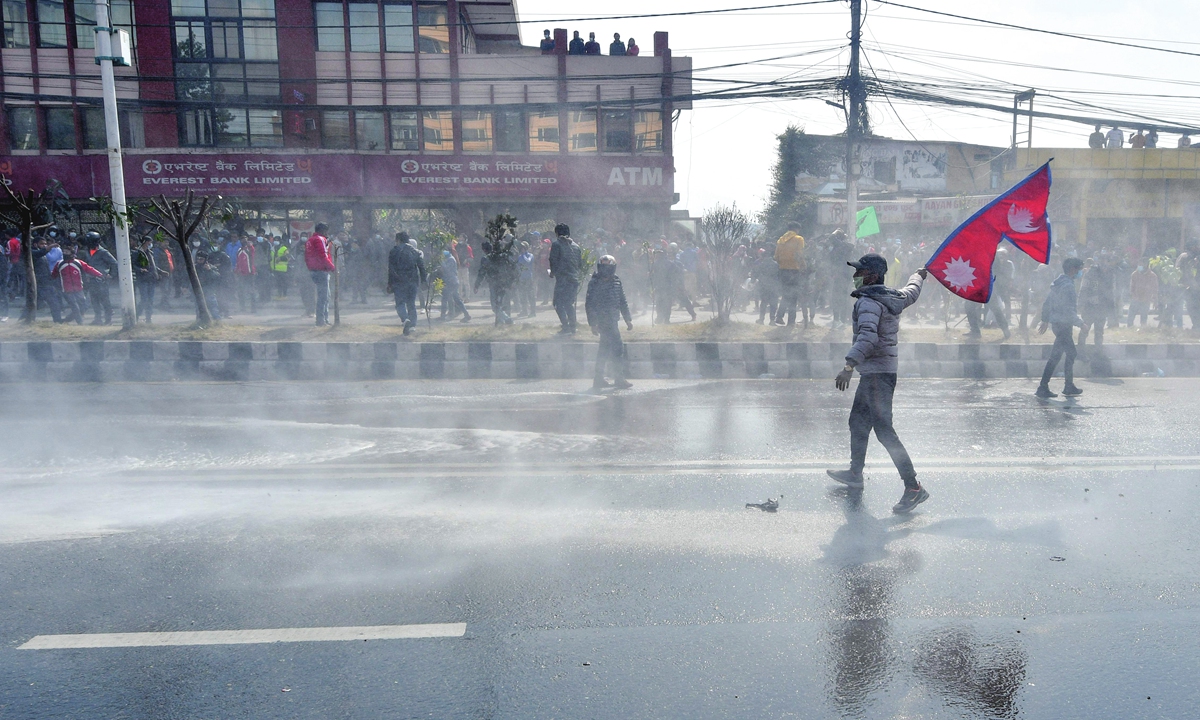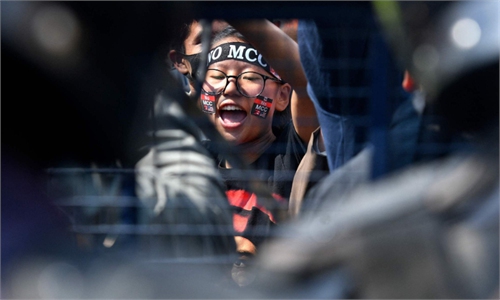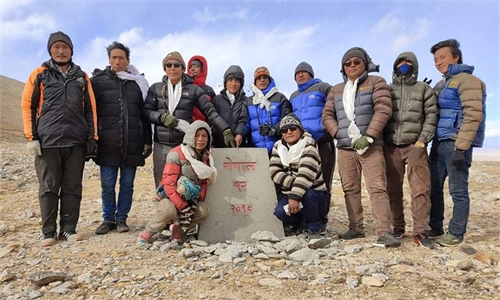IN-DEPTH / IN-DEPTH
Abrupt US official visit to Nepal aims to push SPP, reveals anxiety to contain China: source

Demonstrators protest against the proposed grant agreement from America under the Millennium Challenge Corporation (MCC), in Kathmandu on February 24, 2022. Photo: VCG
The abrupt, two-day visit of US Assistant Secretary of State for South and Central Asian Affairs Donald Lu to Nepal that started on Thursday largely aims to push for the controversial US-sponsored State Partnership Program (SPP) military pact, a recent political hot potato in Kathmandu, said Nepalese sources and observers.
The US official, who played a key role in the controversial US-Nepal Millennium Challenge Corporation (MCC) economic pact, went to Kathmandu after the Nepali government announced it will not move forward with the SPP in mid-June. This is how the US is pressuring Nepal for the SPP through its embassy and the US Army, a source in Kathmandu close to the matter told the Global Times on condition of anonymity.
The US has not given up efforts to push its SPP military pact with Nepal amid its efforts to contain China via the Indo-Pacific Strategy, and some deals on supplying military equipment, such as two helicopters as a grant under the SPP, are even ongoing, according to the source.
Experts and observers of Nepal are calling on the Nepalese government to resist US pressure and be wary of becoming a pawn in US geopolitics.
"It can harm China-Nepal friendship and mutual understanding if the SPP gets approved. It can lead the nation toward long internal conflict and unrest, and our government should be very careful facing each wave of pressure from the US," Yogeshwar Romkhami, a former senior superintendent of the Nepal Police Service, told the Global Times.
Local media termed Lu's arrival a "sudden visit" without official statements from either side to the public in advance. Many suspect his trip is closely linked to the SPP and Nepali Prime Minister Sher Bahadur Deuba's prospective visit to the US.
"This is a pressing task in current ties between the US and Nepal, so Lu's visit cannot be separated from the SPP. The US is now eager to bring Nepal into its circle to counter China and disrupt the security and stability of China's southwest border region," Liu Zongyi, secretary-general of the Research Center for China-South Asia Cooperation at the Shanghai Institute for International Studies, told the Global Times on Thursday.
Lu's sudden visit also reflects the US' sense of urgency, and the imperious and dominant nature of the trip does not show enough respect for a sovereign nation from the perspective of diplomatic protocols, observers said.
Local media reported that Lu would meet with Deuba and Nepali Foreign Minister Narayan Khadka, among other officials.
Liu said the US could likely offer some sort of quid pro quo, such as Deuba's prospective visit to the US or financial aid, to induce Nepal to proceed with the SPP.
Deuba's planned visit to the US, initially scheduled for mid-July, was postponed, the Kathmandu Post reported, drawing wide speculation in Nepal that the SPP controversy was likely the cause of the delay.
This is Lu's second visit to Nepal since November last year. He was said to be a key person behind convincing Nepal to endorse the controversial MCC deal, local media Online Khabar reported.
After the MCC, the US urged the Himalayan country to join its SPP military alliance, which is widely considered as another component of the US' Indo-Pacific Strategy.
In 2019, a report from the US Defense Department listed Nepal as a new country for the SPP, and in December that year, the State Department also provided aid to Nepal under the SPP arrangement, which critics say has security and military components that put American boots on Nepal's land, the Kathmandu Post reported.
The Nepali government last month decided to withdraw from the project after a draft of the agreement leaked by the media exposed the possibility of US troops staying in Nepal for an indefinite period, which caused wide criticism. However, the Nepali government is yet to officially inform the US of the decision, the Kathmandu Post report said.
As the chief US official in charge of South Asian affairs, Lu's visits have come with pressure on neighboring countries, further creating disputes in China's neighborhood.
It reflects that US diplomacy can no longer defeat China through normal competitive means, but only if it resorts to crooked ways and dishonest practices, Liu said.



